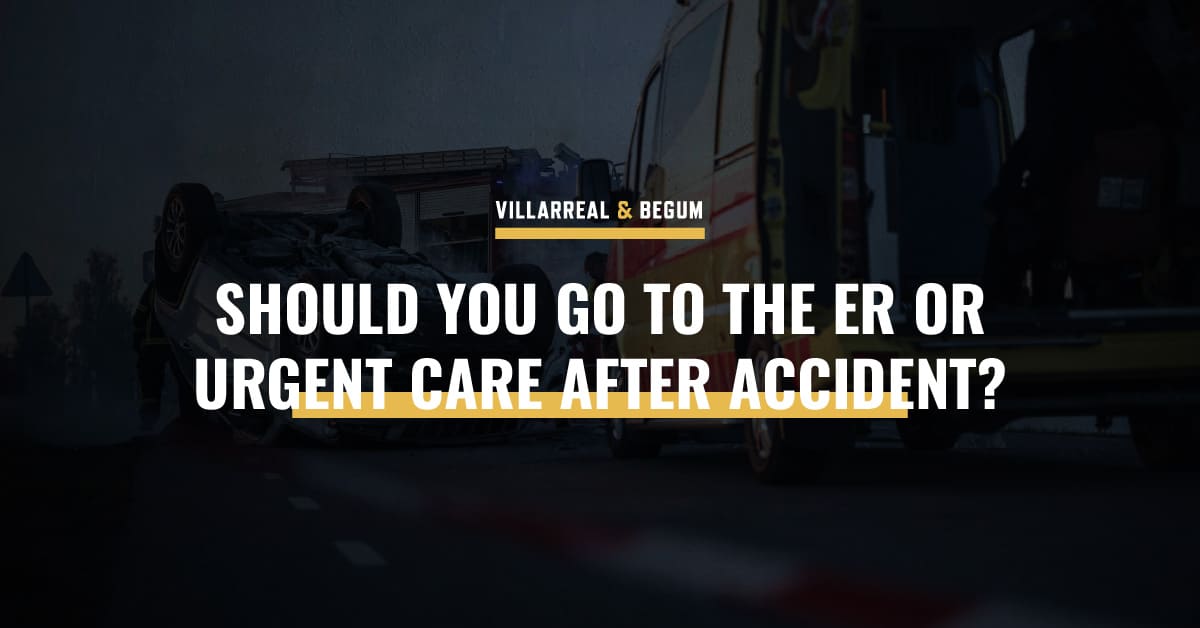When you’ve been involved in a car accident, your well-being should always be your top priority. While the immediate shock and confusion can overshadow the need for medical attention, it’s essential to get checked by a doctor as soon as possible. The question is: should you go to the ER or Urgent Care? In this blog, we’ll outline when you should visit an Emergency Room (ER) versus an Urgent Care center, helping you make informed decisions about your health care following a motor vehicle accident.
When to Visit the Emergency Room (ER)
The Emergency Room is a medical treatment facility offering acute care for patients who come in, either by their own means or by ambulance. The ER is equipped to treat the full spectrum of emergencies. Teams of healthcare professionals, including doctors and nurses who are trained in emergency care, are prepared to handle severe and life-threatening conditions. They have access to advanced medical technology and can perform complex diagnostic tests and life-saving procedures.
What Treatments Are Available in the ER?
Treatments available for car accident victims in the ER include:
- Advanced Imaging Tests: Advanced imaging technologies include X-rays, which detect fractures and dislocations; CT scans, which aid in the assessment of internal bleeding or organ damage, and MRI scans, which can evaluate traumatic brain injuries or spinal cord injuries.
- Surgical Interventions: Some car accident injuries require immediate surgical intervention. This includes operations to stop internal bleeding, repair organ damage, and stabilize broken bones.
- Specialist Care: The ER provides access to medical specialists like neurologists, who can assess and treat head injuries. Orthopedic surgeons are also a key part of the ER team, specializing in the treatment of complex fractures commonly seen in serious car accidents. They handle the surgical repair of these injuries, including any necessary reconstruction and stabilization of the affected bones.
- Trauma Care: This includes stabilizing the patient’s vital signs – monitoring and adjusting heart rate, blood pressure, and respiratory rate to ensure they are within safe limits. Managing shock, a potentially life-threatening condition resulting from severe injury, is also an important aspect of care.
Injuries Requiring ER Treatment
After being involved in a car accident, you should promptly evaluate any injuries to determine if emergency room treatment is required. Certain types of injuries and symptoms are clear indicators that immediate medical attention in the ER is necessary:
- Severe Head Injuries: If you experience symptoms such as loss of consciousness, persistent and severe headaches, vomiting, or confusion, these could be signs of a traumatic brain injury. Such injuries can range from concussions to more severe brain damage and require immediate medical evaluation and treatment.
- Chest Pain or Difficulty Breathing: Experiencing chest pain or having trouble breathing after an automobile accident can be indicative of critical conditions. These symptoms might point to heart trauma, injuries to the lungs, or internal bleeding. Such conditions can rapidly worsen and are considered medical emergencies.
- Spinal Cord Injuries: Symptoms such as intense back pain, weakness, numbness, or paralysis can signify spinal cord damage. Spinal injuries can have long-term implications, including permanent paralysis, and therefore necessitate immediate medical intervention.
- Multiple Fractures: If you have sustained multiple or compound fractures, particularly if the fractures are visible, the affected limb is immobile, or the bone has pierced the skin, you should seek urgent medical care. Such injuries often require surgical intervention and can lead to serious complications if not treated promptly.
- Severe Bleeding: Uncontrolled bleeding or spurting blood are critical conditions that require immediate medical attention. Severe bleeding can lead to shock and other life-threatening complications and needs to be addressed as soon as possible.
- Abdominal Pain: Severe pain in the abdomen following a car accident can be a sign of internal injuries or bleeding. Because internal injuries can be life-threatening and may not always be immediately apparent, seek ER treatment right away.
- Symptoms of Shock: If you exhibit symptoms such as cold, clammy skin, a rapid heartbeat, shallow breathing, dizziness, or fainting, they could be signs of shock. Shock is a life-threatening condition that can occur after severe injury and requires immediate medical care.
When experiencing any of these symptoms after a car accident, it is vital to seek ER treatment promptly to ensure the best possible outcome and to mitigate the risk of long-term complications.
When to Choose Urgent Care
Urgent Care facilities provide care for non-life-threatening medical issues requiring prompt attention. They are ideal for situations where an individual needs immediate medical care for conditions that are not severe enough to warrant a visit to the ER. Urgent Care clinics are staffed with qualified healthcare professionals, including doctors and nurses, who can handle a variety of medical problems.
What Treatments Are Available in Urgent Care?
Urgent Care centers are equipped to handle various minor injuries and conditions that may result from a car accident. Common treatments available at these facilities include:
- Wound Care: Urgent Care staff can thoroughly clean and treat wounds to prevent infection and promote healing. They also provide bandaging and wound care advice for cuts that aren’t excessively bleeding or deep.
- Sprains and Strain Treatment: Sprains (injuries to ligaments) and strains (injuries to muscles or tendons) are common in car accidents. Urgent Care offers initial diagnosis and effective treatment plans for these injuries. This might include advice on home care practices like rest, ice application, compression, and elevation.
- Burn Care: For burns that are not extensive or particularly severe, Urgent Care centers can provide essential care. This includes cleaning the burn, applying appropriate dressings, prescribing pain relief medication, and offering guidance on how to care for the burn at home to ensure proper healing.
- Concussion Treatment: Urgent Care professionals can conduct a thorough assessment and provide critical advice on recovery, including how to manage symptoms and when to seek further medical attention.
- X-rays: Urgent Care centers are often equipped with X-ray technology, allowing them to diagnose simple fractures. They can provide initial care such as splinting to stabilize the affected area. For more complex fractures, they will refer patients to an ER for comprehensive treatment.
- Whiplash Care: Whiplash and other soft tissue injuries common in car accidents can be evaluated and treated at Urgent Care. Treatment plans may include pain management strategies and recommendations for physical therapy or follow-up care.
Auto Accident Injuries That Can Be Treated at Urgent Care
You can get treatment for the following accident-related injuries at the closest Urgent Care clinic:
- Minor Cuts and Bruises: Small lacerations or abrasions that do not involve deep tissue and have controlled bleeding can be treated at Urgent Care. Medical professionals can clean and dress these wounds to prevent infection.
- Sprains and Strains: Treatment may include bracing, advice on rest, ice, compression, and elevation (RICE), and prescribing pain relief medication.
- Mild Whiplash: Whiplash affects the neck muscles and ligaments. Urgent Care can provide a neck brace if necessary, pain management, and recommendations for follow-up care and physical therapy.
- Minor Burns: Small burns that do not cover a large area of the body can be treated in Urgent Care. They offer care to relieve pain, prevent infection, and ensure proper healing.
- Minor Fractures: In cases where the bone hasn’t broken the skin and there’s no significant deformity, Urgent Care can perform X-rays and apply splints to stabilize the fracture.
- Mild Concussions: For patients who have symptoms of a concussion without severe head trauma, Urgent Care can evaluate the severity, provide guidance on monitoring symptoms, and recommend follow-up care.
Car accident victims need to assess their injuries and seek the appropriate level of medical care. For non-life-threatening auto injuries, Urgent Care centers present an alternative to the ER by providing quality medical attention while reducing wait times and medical expenses.
How Can a Texas Personal Injury Lawyer Help You Get Compensation for Your Injuries?
Once your car accident injuries have been properly documented and treated, contact a Texas personal injury lawyer who can explain your rights and the various legal options available to you. The lawyer will also assess the details of your case, including the severity of your injuries and the circumstances of the accident, to determine the potential compensation you may be entitled to.
Personal injury lawyers are experienced in dealing with insurance companies. They will firmly reject any lowball offers and demand a fair settlement that covers medical expenses, lost wages, and other damages. If a settlement cannot be reached, your accident lawyer will represent you in court. They will present your case, argue on your behalf, and aim to secure the maximum compensation you deserve.
Most personal injury lawyers in Texas work on a contingency fee basis. This means that you don’t pay anything upfront. They only get paid if you win your case, so you have absolutely nothing to lose by reaching out today.
Speak to a Texas Car Accident Lawyer Today
If you have been seriously injured in a preventable auto accident, contact the Villarreal & Begum, LAW GUNS, for a no-obligation consultation and case review. Our accident lawyers understand the challenges you are facing and are committed to fighting for the fair compensation you deserve. To schedule your free initial consultation with a personal injury attorney, call (210) 800-0000 or contact us online today.
Related:
HOSPITAL, ER, OR URGENT CARE AFTER A TEXAS ACCIDENT
HOW LONG TO GET AN INSURANCE CHECK AFTER A WRECK?
CALCULATING LOST WAGES AFTER AN ACCIDENT
HEADACHES AFTER AN ACCIDENT IN TEXAS
Commercial Vehicle Accident Lawyers
Should Undocumented Immigrants Go to Hospital After an Accident?

Alex has tried over 50 trials to verdict and tried or settled over five hundred million dollars in cases. Alexander Begum is a founding shareholder of the Villareal & Begum Law Firm. Born and raised in Texas.





